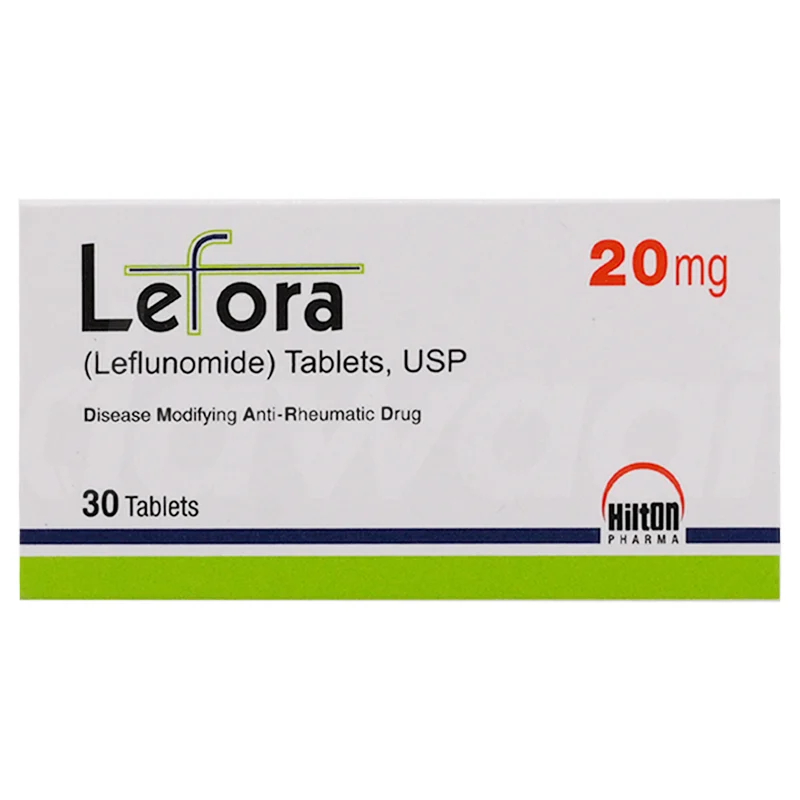Lefora (Leflunomide) 10 mg & 20 mg Tablets is an oral disease-modifying antirheumatic drug (DMARD) used to treat autoimmune conditions such as rheumatoid arthritis and psoriatic arthritis. Leflunomide works by suppressing the immune system to reduce inflammation and slow the progression of joint damage. By targeting and reducing inflammation, Lefora helps relieve pain, swelling, and stiffness, ultimately improving joint function and overall quality of life.
Key Features and Benefits:
- Reduces Inflammation: Leflunomide decreases immune system activity, thereby reducing inflammation, pain, and swelling associated with rheumatoid arthritis and psoriatic arthritis.
- Slows Disease Progression: As a DMARD, Lefora helps slow the progression of joint damage caused by autoimmune conditions, preserving joint function and mobility.
- Long-Term Symptom Relief: With consistent use, Leflunomide helps manage chronic pain and discomfort, improving the overall quality of life for patients with autoimmune arthritis.
- Oral Administration: Available in convenient tablet form, taken once daily, simplifying adherence to treatment regimens.
- Improves Joint Function: Regular use of Lefora reduces the signs and symptoms of arthritis, improving joint function and range of motion.
Usage Instructions:
- Dosage:
- Adults (Rheumatoid or Psoriatic Arthritis):
- The typical starting dose is 100 mg once daily for the first 3 days, followed by a maintenance dose of either 10 mg or 20 mg once daily, depending on patient response and tolerance.
- Dosage Adjustments: Based on how the patient responds to treatment, the dosage may be adjusted. Your healthcare provider will determine the most appropriate maintenance dose.
- Adults (Rheumatoid or Psoriatic Arthritis):
- Administration:
- Take Lefora tablets orally, with or without food.
- Swallow the tablet whole with a glass of water. Do not crush or chew the tablet.
- Frequency:
- Once Daily: Lefora is usually taken once daily, preferably at the same time each day to maintain consistent levels of the medication in the bloodstream.
- Duration of Treatment:
- Leflunomide is generally prescribed as a long-term treatment to manage rheumatoid arthritis and psoriatic arthritis. Continue taking it as directed by your healthcare provider, even if symptoms improve.
- Do not discontinue use without consulting your healthcare provider, as stopping treatment may lead to a return of symptoms.
- Missed Dose:
- If you miss a dose, take it as soon as you remember.
- If it is near the time of your next dose, skip the missed dose and resume your regular dosing schedule.
- Do not take two doses at the same time to make up for a missed dose.
Precautions:
- Consult a Healthcare Provider: Always use Lefora under the supervision of a qualified healthcare professional to ensure appropriate treatment and minimize risks.
- Pregnancy and Breastfeeding: Leflunomide is contraindicated during pregnancy due to the risk of birth defects. Women of childbearing potential should use effective contraception and undergo a washout procedure before attempting pregnancy. Consult your healthcare provider if you are pregnant, planning to become pregnant, or breastfeeding.
- Liver Function: Leflunomide can affect liver function, so regular liver function tests (LFTs) are required. Inform your healthcare provider if you have a history of liver disease or elevated liver enzymes.
- Blood Tests: Regular blood tests are necessary to monitor blood cell counts, as Lefora can suppress the bone marrow, potentially causing anemia, leukopenia, or thrombocytopenia.
- Kidney Function: Patients with impaired kidney function should use Lefora cautiously and under medical supervision, as dosage adjustments may be required.
- Infection Risk: Because Lefora suppresses the immune system, it may increase the risk of infections. Notify your doctor if you experience symptoms of infection, such as fever, sore throat, or cough.
- Drug Interactions: Inform your healthcare provider about all other medications and supplements you are taking, as Leflunomide may interact with other drugs, particularly those that affect the liver.
Possible Side Effects:
- Common Side Effects:
- Diarrhea
- Nausea or vomiting
- Headache
- Elevated liver enzymes
- Rash or itching
- Hair thinning or loss (alopecia)
- Less Common Side Effects:
- Weight loss
- Dizziness
- Weakness or fatigue
- High blood pressure
- Serious Side Effects (Seek Medical Attention Immediately):
- Signs of liver dysfunction, such as yellowing of the skin or eyes (jaundice), dark urine, or persistent nausea and vomiting.
- Severe allergic reactions, including rash, itching, swelling, dizziness, or difficulty breathing.
- Persistent fever, sore throat, or signs of infection.
- Unexplained bruising, bleeding, or extreme fatigue (potential signs of low blood cell counts).
Storage Instructions:
- Temperature: Store Lefora 10 mg or 20 mg tablets at room temperature, between 15°C to 30°C (59°F to 86°F), away from direct sunlight and moisture.
- Accessibility: Keep the medication out of reach of children to prevent accidental ingestion.
- Packaging Integrity: Ensure that the blister packs or bottles are tightly sealed after each use to protect the tablets from environmental factors and maintain their efficacy.
- Expiration: Do not use the tablets beyond the expiration date indicated on the packaging. Discard any unused medication after this date.


